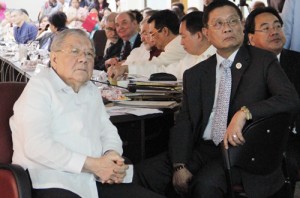House Speaker Feliciano Belmonte, Jr. is in favor of the online libel provisions of the Cybercrime Prevention Act of 2012 provided that the harsh penalties are stricken down.
Belmonte made the statement after the Supreme Court on Tuesday upheld the constitutionality of the Cybercrime law, including its controversial provisions on online libel.
Under the Cybercrime law, criticisms posted on social networking sites that are deemed libelous could send a person to jail for 12 years.
“I have talked to people and what has been the source of complaints is the higher penalty [for online libel]. I would say that online libel should be considered [penalized] under the Cybercrime law, but I don’t think it should have a higher penalty that what is provided [for libel] in the Revised Penal Code,” Belmonte said.
The Revised Penal Code defines libel as a public and malicious imputation of a crime, or of a vice or defect, real or imaginary, or any act, omission, condition, status or circumstance tending to discredit or cause the dishonor or contempt of a person.
Under the Revised Penal Code, the penalty for libel ranges from P200 to P6,000 in addition to imprisonment of from six months to six years.
But Rep. Terry Ridon of the Kabataan party-list — one of the groups that lodged a petition questioning the legality of the Cybercrime law — said the Supreme Court’s ruling on online libel impedes the people’s civil liberties on the internet.
“The upholding of the provision for online libel poses imminent threats to many content creators. Libel in itself has been abused for so many years to harass and malign journalists. What’s stopping cunning individuals from exploiting the new online libel provision? I see none,” said Ridon, who served as legal counsel in one of the 15 petitions assailing the Cybercrime law.
“The fight against e-Martial Law is far from over. We call on everyone to up the ante and once again show our collective dissent against this repressive law,” Ridon said.
“While the high court reportedly aimed to strike a balance between the protection of civil liberties and government control, we still believe that the law is potent enough to impede our freedom of expression. It is lamentable that we now have a set of firm restrictions over cyber activity, yet we do not have a law that lays down the rights of internet users,” Ridon added.


